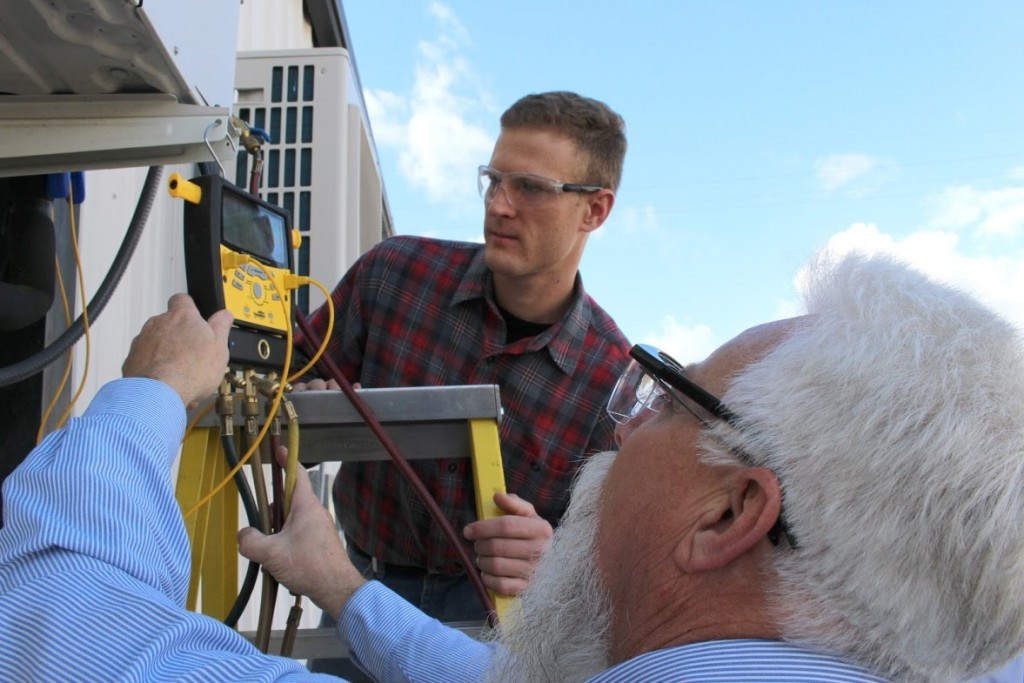
For some, the ability to walk indoors in a cool, air-conditioned environment in order to escape the heat of summer is a luxury. For others, it’s simply a necessity. Either way, it wouldn’t be possible without an air conditioning unit, and an air conditioning unit wouldn’t function properly without refrigerant. Below, we’ll cover some of the basics, but be sure to look into our HVAC Services Training to really dive into the meat of the material.
The fact of the matter is that refrigerants are not “one size fits all”; in fact, putting the wrong type of refrigerant in a unit can cause major problems for your customer. That’s why at ITI Technical College, we make sure you’re well trained on the basics – and that includes covering the different types of refrigerants, when to use them, and why they’re important when you are an HVAC services professional.
Different Types Of Refrigerants

You may recognize the brand names of the different types of refrigerants, but it’s important to know them by their actual names as well: R-22, otherwise known as Freon; R-410A, otherwise known as Puron, Suva 9100, or Genetron AZ-20; R-407C, otherwise known as Suva 407C or Genetron 407C; and R-134a.
R-22 has been widely used for several years in the HVAC industry, but in 2010 was discontinued for use in new AC units. In 2015, the use of Freon was eliminated across the board for its contributions to ozone depletion. Needless to say, you’ll hear of and learn about Freon as it’s been used in the past, but it will not be something you’re able to apply post-graduation.
R-410A is the most common refrigerant for new light commercial unitary AC units and requires an AC unit with components capable of working at higher pressures.
R-407C is similar in operating characteristics to Freon but does not contribute to ozone depletion. It is a high-glide refrigerant that isn’t very efficient, but for systems that have operated on Freon in the past, it provides the simplest conversion due to similar pressures.
R-134a is the first non-ozone-depleting fluorocarbon refrigerant to be commercialized and is a single-component refrigerant with no glide.
Why It Matters
To skim the surface of our HVAC service training material, using the proper refrigerant for the proper system is important for a number of reasons. First and foremost, R-22 has been retired for ozone depletion – a matter that should be taken very seriously. Though systems may function on R-22, it is our aim to see and ensure that every unit transitions to a more environmentally appropriate type of refrigerant for the sake of the world we live in.
In addition, newer AC models are designed to be used with R-410A, as it can absorb and release more heat, and makes it a more reliable and efficient operation. When you utilize the most efficient refrigerant for the unit, not only does that allow the compressor to run at a cooler temperature, but it also reduces the risk of burnout due to overheating.
Lastly, different units can handle different pressures within the coils. Refrigerants vary in their pressure levels, and putting the incorrect refrigerant in a unit that is unable to handle greater pressures is likely to crack the coil and break the entire unit.
Where To Complete Your HVAC Services Training

This covers basic refrigerant information, though there’s much more to consider when working with AC units and different types of refrigerants. If you want to dive into the information in order to get your HVAC certification, look no further than ITI Technical College’s HVAC Service Training. We offer two programs, a Certificate, known as Air Conditioning and Electrical Technology, and an Associate of Occupational Studies, known as Air Conditioning, Refrigeration, and Electrical Technology.
The Certificate program is designed to give adult students of all ages the opportunity to learn the concepts and practices of refrigeration, air conditioning, and heating equipment, as well as the electrical technology required to work in this vital and ever-growing industry. The Associates add additional concepts as well as refrigeration technology. All students will be exposed to the fundamentals of HVAC, including heat transfer, refrigerants, safe work practices, electricity, and all regulations surrounding the use of these systems.
Lastly, HVAC certification exams are given during the program to allow the student to obtain industry competencies as they go. Would you like more information? Our Web site has access to a net price calculator, program disclosures, and more helpful information just one click away. Don’t hesitate to apply, or contact us for more information.
For more information about graduation rates, the median debt of students who completed the program, and other important information, please visit our website: https://iticollege.edu/disclosures/

